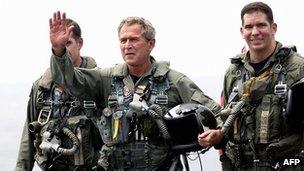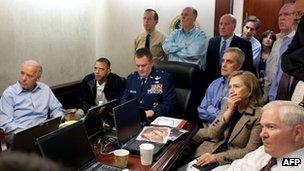Should Obama politicise Bin Laden's death?
- Published
- comments

Obama's supporters say President Bush used the Iraq War in his 2004 re-election campaign
President Barack Obama is being accused by opponents of making political capital out of the killing of Osama Bin Laden a year ago.
That's not surprising - he is indeed making a big deal out of it.
The question is whether doing so is distasteful and whether his campaign is politicising something that should be above politics.
Vice-President Joe Biden says a bumper sticker slogan to sum up the four years could read: "Bin Laden is dead. General Motors is alive."
There is no doubt the death of America's Most Wanted is being used as an essential backdrop to Mr Obama's re-election campaign.
His team won't allow anyone to run away with the idea that the Navy Seals raid was the inevitable result of obvious decisions taken by shadowy figures within the administration.
Instead, they hammer home the view that the president made a courageous and difficult call, going against the advice of many of those around him.
This is pushed explicitly in a new campaign video narrated by Bill Clinton, external.
There have been several detailed insider accounts, external which support the idea of a tough and risky decision-maker at the top.
It is certainly true that had the raid gone wrong the political fall-out would have been huge.

Americans can expect to see more of this Situation Room shot, taken during the Bin Laden operation
Think Black Hawk Down. Think Jimmy Carter's failed attempt to rescue the hostages in Iran. Then multiply by a factor of 10.
The video is also explicit in suggesting that Mitt Romney would not have made the same call as Mr Obama, quoting him as saying: "It's not worth moving heaven and earth spending billions of dollars just trying to catch one person."
Fox News suggest that this is unfair and taken out of context because Romney went on to add: “He is going to pay. He will die.", external
It is hardly surprising that Mr Obama wants to use Bin Laden's death as a symbol. It may not be the only success of his administration. But it is the only one unadulterated by party politics.
The only one that was celebrated by just about every American, of every political persuasion. It was greeted with glee by some of those who might usually see Mr Obama as weak on national security.
When some worry that he is a consensus seeker, a ditherer, this version of the president is a gutsy risk taker.
The fact that Mr Obama got Osama is a backdrop, a context, to every other, more contentious foreign policy decision.
It was inevitable that it would be used in the campaign, but his team have pushed it in a particularly bullish, even boastful way.
It is just as inevitable that opponents will portray that as unseemly immodesty.
The crudeness of the presidential pitch may put some off, but any row that is created only serves to highlight that Bin Laden was indeed killed on Mr Obama's watch, on his orders.